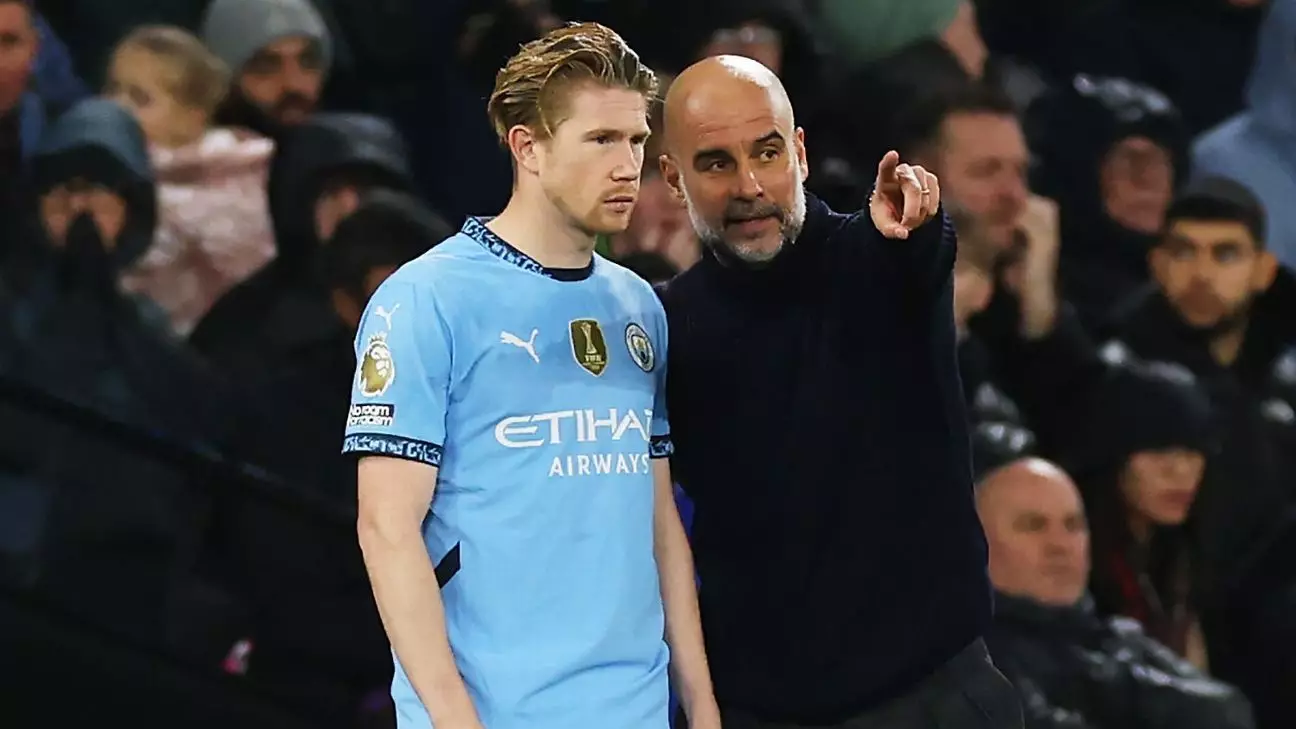In the world of football, narratives often take the forefront—especially when it involves star players and their managers. Recently, Manchester City manager Pep Guardiola found himself amidst swirling speculations concerning his relationship with Kevin De Bruyne. The Belgian midfielder has been sidelined and restricted to a limited role since returning from an abdominal injury sustained in September. This situation has caused pundits and fans alike to question whether there’s a deeper underlying issue between the two.
Kevin De Bruyne’s presence on the pitch can significantly alter the dynamics of a football match. However, his recent track record raises concerns. Since the injury against Inter Milan, De Bruyne has only made five substitute appearances, leading to questions about his fitness and selection. Despite being a crucial part of Manchester City’s success over the years, his age and injury history have contributed to an inconsistent attendance on the field. Guardiola’s decision to introduce De Bruyne only after City was 2-0 down against Liverpool on a crucial match day has fueled the theory that the manager may be deliberately limiting the playmaker’s involvement.
The situation becomes complicated when considering the demands of elite football, where both players and managers are under immense pressure to perform consistently. The weight of expectation, particularly for a player of De Bruyne’s caliber, only amplifies these pressures. Fans may struggle to reconcile the notion of their star player, once integral to winning trophies, now being benched during critical moments.
With the recent developments, pundits like Gary Neville and Jamie Carragher have begun to voice their opinions. Neville described the situation as “unusual, bizarre, strange,” emphasizing that something unusual must be occurring behind closed doors. Similarly, Carragher echoed these sentiments, suggesting that De Bruyne’s absence during fit training raises red flags. Their views reflect a broader skepticism that has crept into the dialogue surrounding the club.
While critics and analysts offer their takes, it’s essential to dissect what drives such perceptions. In high-stakes environments like the Premier League, where every point matters and momentum is crucial, any perceived discontent can become a talking point for pundits who thrive on the drama of football narratives. This storytelling often overshadows actual facts, leading to exaggerated notions of conflict within a team.
In a recent news conference, Guardiola addressed the concerns surrounding De Bruyne, expressing an emphatic denial of any personal issues with his player. He stated, “Do you think I like to not play with Kevin? No, I don’t want Kevin to play.” His comments underscore the reality that player management is multifaceted, particularly with aging athletes coming back from injuries.
Guardiola further explained the need for patience, suggesting that both he and De Bruyne understand the importance of physical fitness. At 33 years old, De Bruyne needs time to rediscover his prime form. The challenges of an aging body in a sport demanding physicality and high energy cannot be overlooked. Guardiola’s emphasis on collective responsibility highlighted a crucial aspect of team dynamics: no single player, regardless of their brilliance, can singularly solve all problems.
Amidst the turmoil, there lies a glimmer of hope for both Guardiola and City supporters, particularly with the prospect of facing Nottingham Forest soon. Guardiola hinted that De Bruyne could be reintegrated into the squad as he builds back his fitness. However, the manager tempered expectations by acknowledging that even a fully fit De Bruyne wouldn’t single-handedly turn the team’s fortunes around.
The overarching truth is that football is a team sport. Success hinges on unity and collaboration, not just the brilliance of individual stars. As City navigates through a challenging phase marked by setbacks, the objective remains clear: to regain momentum as a cohesive unit, ultimately reestablishing the synergy that once propelled them to the upper echelons of the league.
While speculation may abound regarding De Bruyne and Guardiola’s relationship, the reality is much more nuanced. The road back for both player and manager involves understanding the complexities of modern football and the intricate balance of personal health, team dynamics, and performance expectations.

